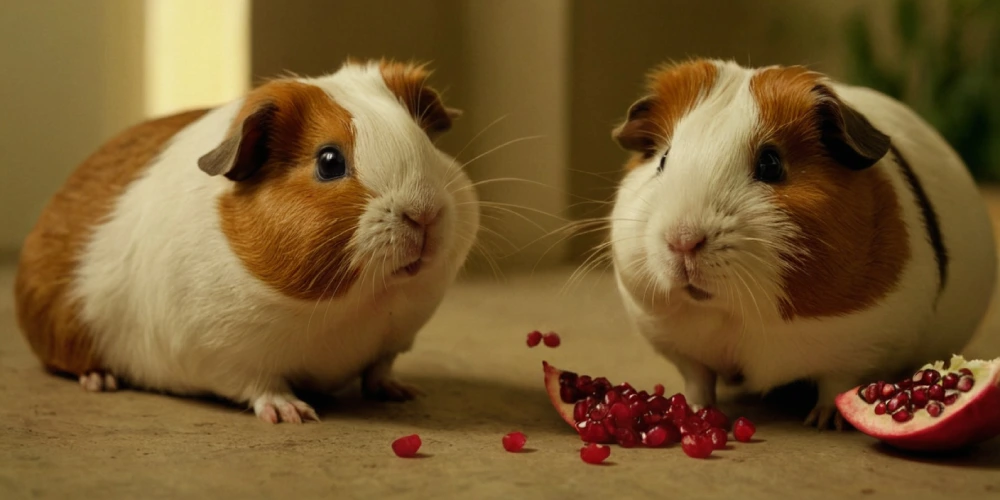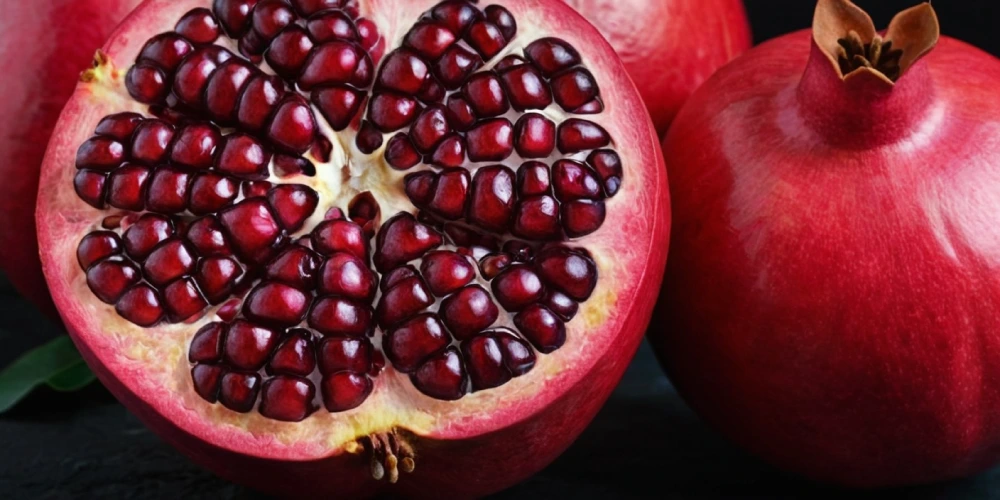
Can Guinea Pigs Eat Pomegranate?
Guinea pigs are adorable pets that need proper care and diet to stay healthy. They primarily eat hay, fresh vegetables, and small amounts of fruit. Many pet owners enjoy giving their guinea pigs different treats, but knowing which ones are safe is essential. One common question is whether guinea pigs can eat pomegranate. This article will explain everything about feeding pomegranate to guinea pigs, including its benefits, risks, and the best way to serve it.
What Is Pomegranate?
A pomegranate is a bright red fruit filled with juicy seeds. It is known for its sweet and slightly tart flavor. The fruit is suitable for people because it contains vitamins, minerals, and antioxidants. However, guinea pigs have different dietary needs, so knowing how pomegranate affects them is essential before feeding it to your pet.
Nutritional Value of Pomegranate
Pomegranates are packed with nutrients. They contain vitamin C, vitamin K, fiber, and antioxidants. It is especially crucial because guinea pigs cannot synthesize vitamin C alone. Eating foods rich in vitamin C helps prevent illnesses like scurvy. However, pomegranate also contains natural sugars, which can be harmful in large amounts.
Can Guinea Pigs Safely Eat Pomegranate?
Yes, guinea pigs can eat pomegranate, but only in small amounts. It should be treated as an occasional snack rather than a regular part of their diet. While pomegranate offers some health benefits, it also has drawbacks.
Benefits of Feeding Pomegranate to Guinea Pigs
High in Vitamin C
Pomegranates contain Vitamin C, which is necessary for guinea pigs. This vitamin helps boost their immune systems, keeping them healthy and strong. A small amount of pomegranate can increase your pet’s vitamin C.
Rich in Antioxidants
Pomegranate antioxidants help protect cells from damage caused by free radicals. These compounds can promote overall health and reduce the risk of certain diseases in guinea pigs.
Contains Dietary Fiber
The fiber in pomegranate can help improve digestion. Guinea pigs need a fiber-rich diet to maintain a healthy gut; small portions of pomegranate can support this.
Risks of Feeding Pomegranate to Guinea Pigs
High Sugar Content
Pomegranate has a lot of natural sugars. In guinea pigs, excessive sugar consumption can result in obesity, digestive disorders, and other health problems. Giving pomegranates in moderation is crucial.
Risk of Choking
Guinea pigs can choke on pomegranate seeds. They are small and slippery, making it difficult to chew correctly.
Acidity Levels
Pomegranate is acidic, irritating a guinea pig’s mouth or digestive system if consumed in large quantities. Over time, this may cause discomfort or even health issues.
How to Serve Pomegranate to Guinea Pigs
If you decide to give a pomegranate to your guinea pig, follow these simple steps:
- Wash the Fruit Thoroughly. Verify that the pomegranate is clean and devoid of dirt or pesticides.
- Remove the Seeds. Carefully remove the seeds. Avoid giving your guinea pig the outer rind, as it is not suitable for them to eat.
- Serve a Small Portion. Give your guinea pig only a few seeds at a time. A small portion is enough to enjoy the benefits without causing harm.
- Monitor Your Guinea Pig Observe your pet after feeding them pomegranate for the first time. Keep an eye out for any indications of pain or allergic responses.
How Often Can Guinea Pigs Eat Pomegranate?
Pomegranate should only be given as an occasional treat. Once or twice a month is sufficient. Their primary diet should consist of hay, vegetables, and guinea pig pellets.
What Happens if a Guinea Pig Overeats Pomegranate?
If a guinea pig overeats pomegranate, they may experience digestive problems such as diarrhea or stomach pain. Over time, excessive sugar may cause weight gain and other health problems. Always stick to small portions.
Alternative Fruits for Guinea Pigs
Take into account these safer choices if you wish to provide your guinea pig with a range of treats:
- Apple (without seeds): A sweet and crunchy treat that guinea pigs enjoy.
- Blueberries: Low in sugar and plenty of antioxidants.
- Strawberries: safe when taken in moderation and a good source of vitamin C.
- Cucumber: Hydrating and low in sugar, perfect for hot days.

Signs Your Guinea Pig May Not Like Pomegranate
Not all guinea pigs will enjoy pomegranate. If your pet refuses to eat it, don’t force them. Signs that they don’t like or tolerate pomegranate include:
- Refusing to eat the seeds.
- Spitting out the food.
- Showing signs of discomfort or unusual behavior.
Tips for a Balanced Guinea Pig Diet
To keep your guinea pig healthy, follow these essential diet tips:
- Hay: Unlimited hay is necessary for their digestive health.
- Fresh Vegetables: Offer leafy greens like lettuce, kale, and spinach daily.
- Pellets: Use high-quality guinea pig pellets as a supplement.
- Water: Ensure fresh water is always available.
Conclusion
Pomegranates can be a delightful and nutritious treat for guinea pigs when given in small quantities. They offer valuable nutrients like vitamin C and antioxidants but also have risks such as high sugar content and choking hazards. Always serve pomegranates in moderation and monitor your pet for any adverse reactions. Remember, their primary diet should be hay, vegetables, and pellets to ensure they stay happy and healthy.
FAQs
1.Can guinea pigs eat pomegranate skin?
No, guinea pigs should not eat the skin of a pomegranate. It is challenging, not nutritious, and difficult for them to digest.
2.Are pomegranate seeds dangerous for guinea pigs?
The seeds are not toxic, but they can pose a choking hazard. Always feed your guinea pig only a few seeds at a time and supervise them.
3.Can baby guinea pigs eat pomegranate?
It is best to avoid giving pomegranate to baby guinea pigs. Their digestive systems are more sensitive and need a diet focused on hay and pellets.
4.Is dried pomegranate safe for guinea pigs?
No, dried pomegranate is not safe for guinea pigs. It contains concentrated sugar, which can harm their health.
5.What should I do if my guinea pig overeats pomegranate?
If you think your guinea pig ate too many pomegranates, keep a close eye out for any signs of pain or stomach issues. If you see anything out of the ordinary, call a veterinarian.
